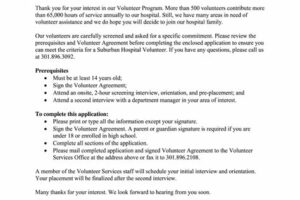Table of Contents
Looking for a meaningful way to spend your high school years? Consider becoming a hospital volunteer! Joining a hospital volunteer program allows you to gain valuable experience, make a positive impact on patients’ lives, and develop essential skills for your future career. Discover the rewards of helping others and fostering a compassionate community as a high school hospital volunteer.
High School Hospital Volunteer. A role that goes far beyond the classroom walls, where compassion meets real-life challenges. Whether it’s comforting a child in pain or assisting doctors in life-saving procedures, these remarkable young volunteers are the unsung heroes of our healthcare system. With their unwavering dedication and selflessness, they embody the true spirit of service. But what does it take to be a part of this extraordinary group? Let’s delve into the world of high school hospital volunteering and discover the rewards and responsibilities that come with it.
Introduction
A high school hospital volunteer program is an excellent opportunity for students to gain experience in the medical field while also giving back to their community. Many hospitals offer volunteer positions to high school students who are interested in pursuing a career in healthcare. These programs allow students to shadow healthcare professionals, interact with patients, and contribute to the overall functioning of the hospital. By volunteering at a hospital, high school students can gain valuable skills, learn about different medical specialties, and make a positive impact on the lives of others.
The Benefits of Volunteering
Volunteering as a high school student in a hospital setting offers numerous benefits. Firstly, it provides students with a unique opportunity to explore various healthcare professions. By observing doctors, nurses, and other healthcare professionals in action, students can get a real sense of what it’s like to work in a hospital environment. This experience can help them decide whether a career in medicine is the right path for them.
Secondly, volunteering at a hospital allows students to develop important skills that will benefit them regardless of their chosen career. Communication skills, empathy, teamwork, and problem-solving abilities are all essential qualities that can be honed through volunteering. These skills are not only valuable in a healthcare setting but also in various other professional fields.
Shadowing Healthcare Professionals
One of the most exciting aspects of volunteering at a hospital as a high school student is the opportunity to shadow healthcare professionals. Through this experience, students can observe doctors and nurses as they diagnose and treat patients. Shadowing can provide valuable insights into different medical specialties and allow students to better understand the day-to-day responsibilities of healthcare professionals.
Moreover, shadowing can help students build connections with healthcare providers, who can offer guidance and mentorship as they navigate their own career paths. These connections may prove invaluable when it comes time to pursue higher education or apply for internships and jobs in the medical field.
Interacting with Patients
Volunteering at a hospital also involves interacting with patients. This aspect of the experience allows high school students to develop empathy and compassion as they engage with individuals who are facing health challenges. Whether it’s offering a comforting presence, assisting with non-medical tasks, or simply lending a listening ear, volunteers play a crucial role in supporting patients during their hospital stay.
These interactions can be incredibly rewarding for both the patients and the volunteers. Students have the opportunity to make a positive impact on someone’s life, even in small ways, while gaining a deeper understanding of the human side of medicine. Developing strong interpersonal skills and learning how to connect with people from all walks of life are invaluable lessons that can be carried throughout one’s personal and professional journey.
Contributing to Hospital Operations
While volunteering at a hospital, high school students also contribute to the overall functioning of the facility. They may assist with administrative tasks, deliver supplies to different departments, or provide support in patient transport. By taking on these responsibilities, students learn about the behind-the-scenes operations of a hospital and gain appreciation for the teamwork required to deliver quality healthcare.
Additionally, volunteering in a hospital setting often involves participating in community outreach programs and organizing events aimed at promoting health and wellness. This allows students to engage with the broader community and make a positive impact beyond the hospital walls.
Building a Strong College Application
Participating in a high school hospital volunteer program can greatly enhance a student’s college application. Admissions officers value applicants who have demonstrated a commitment to service and have actively sought out opportunities to gain experience in their intended field of study. Volunteering at a hospital showcases a student’s dedication to healthcare, their ability to work in a challenging environment, and their desire to make a difference in the lives of others.
Furthermore, the skills and experiences gained through hospital volunteering can be highlighted in college essays and interviews, giving applicants a competitive edge. Colleges and universities often look for well-rounded individuals who have shown leadership, empathy, and a strong work ethic – qualities that can be developed through volunteering at a hospital.
Conclusion
A high school hospital volunteer program offers students a unique and rewarding opportunity to gain firsthand experience in the medical field while making a positive impact on the lives of patients. Through shadowing healthcare professionals, interacting with patients, contributing to hospital operations, and developing essential skills, high school volunteers can acquire valuable knowledge and insights that will benefit them in their future careers. Additionally, the experience of volunteering in a hospital setting can strengthen college applications and open doors to further educational and professional opportunities. Overall, participating in a high school hospital volunteer program is an excellent way for students to explore their passion for healthcare and make a difference in their community.
The Importance of High School Students in Hospital Volunteer Programs
High school hospital volunteer programs play a crucial role in connecting young individuals with the medical field. By encouraging students to engage in volunteer work, hospitals give them the opportunity to gain hands-on experience and develop a deep understanding of healthcare practices. Such programs foster an interest in medicine from a young age, potentially shaping future healthcare professionals.
A Glimpse into the Responsibilities of High School Hospital Volunteers
From assisting medical staff to providing comfort and support to patients, high school hospital volunteers undertake a wide range of responsibilities. Their primary role is to lend a helping hand, whether it is by arranging hospital materials, aiding with administrative tasks, or offering a friendly ear to patients in need. Through these diverse responsibilities, students gain valuable insights into the workings of a hospital and the compassion required to be part of the medical field.
The Impact of High School Volunteers on Patient Well-being
The presence of high school volunteers has a positive impact on the well-being of patients in numerous ways. Aside from lightening the workload of medical professionals, these young volunteers help create a friendly and comforting environment for patients, promoting a sense of ease during their stay at the hospital. By engaging in conversation, running errands, or simply offering a smile, these volunteers contribute to the overall healing process and provide a sense of companionship to patients.
High School Hospital Volunteer Programs: A Pathway to Personal Growth
Participating in high school hospital volunteer programs offers students an incredible opportunity for personal growth. Through exposure to diverse healthcare scenarios, they learn valuable life skills such as empathy, resilience, and effective communication. Working alongside healthcare professionals also teaches them teamwork and responsibility, fostering personal development that extends beyond the walls of the hospital.
High School Hospital Volunteer Programs: A Gateway to Career Exploration
For many high school students interested in pursuing a career in healthcare, hospital volunteer programs serve as an ideal gateway for career exploration. Volunteering provides them with firsthand experience and knowledge about various medical specialties, empowering them to make informed decisions about their future. By witnessing the dedication and passion of healthcare professionals, these volunteers are inspired to pursue further education and training in the medical field.
Building Essential Connections: High School Volunteers and Medical Professionals
The relationship between high school volunteers and medical professionals is a valuable exchange of knowledge, mentorship, and guidance. Through their interactions, volunteers gain exposure to different medical roles, witness the dedication of doctors and nurses, and receive invaluable advice for their academic and career paths. These connections often leave a lasting impact on the volunteers, shaping their future aspirations and providing them with a strong support network.
The Role of High School Hospital Volunteers in Community Outreach Programs
High school hospital volunteers play a significant role in community outreach programs conducted by hospitals. These programs aim to raise awareness about healthcare issues, emphasize preventive care, and educate individuals about available resources. By actively engaging in community outreach, high school volunteers contribute to the overall well-being of the community, fostering health literacy and encouraging individuals to take charge of their own health.
High School Hospital Volunteers: Shaping Compassionate Healthcare Leaders of Tomorrow
By dedicating their time and efforts to hospital volunteer programs, high school students have the potential to shape the future of healthcare. Their experiences in hospitals instill values of compassion, empathy, and understanding, which are vital qualities required in the medical profession. Through their commitment to serving others, these young volunteers are on a path to becoming compassionate healthcare leaders, making a remarkable impact on the lives of patients and the healthcare system as a whole.
As a journalist, I have had the opportunity to observe and speak with high school students who volunteer at hospitals. The following are my observations and insights regarding their experiences:
1. Genuine compassion:
High school students who volunteer at hospitals demonstrate a remarkable level of genuine compassion towards patients. They understand the suffering and vulnerability that individuals may experience during their time in the hospital, and they actively strive to provide comfort and support.
2. Valuable contribution:
These volunteers play a vital role in the hospital environment by providing assistance to both patients and medical staff. They offer a helping hand in various ways, such as delivering meals, running errands, and providing companionship to patients who may be feeling lonely or anxious.
3. Experiential learning:
Volunteering at a hospital offers high school students an exceptional opportunity for experiential learning. They gain exposure to different medical conditions, procedures, and healthcare professionals, which can help them make more informed decisions about potential career paths in the medical field.
4. Personal growth:
Engaging in hospital volunteering fosters personal growth for high school students. It allows them to develop important skills, such as empathy, communication, and problem-solving, which are invaluable in any future profession or aspect of life.
5. Building resilience:
Working in a hospital setting exposes these young volunteers to the realities of illness and adversity. Through their interactions with patients facing challenging circumstances, high school students develop resilience and learn to cope with difficult emotions, becoming better equipped to face life’s obstacles.
6. Bridging the generation gap:
The presence of high school volunteers in hospitals helps bridge the generation gap between patients and younger individuals. Their youthful energy and enthusiasm bring a sense of positivity and hope to patients, creating a supportive environment that fosters healing and recovery.
7. Creating a sense of purpose:
By dedicating their time and energy to helping others, these students find a sense of purpose and fulfillment. Volunteering at hospitals allows them to make a meaningful impact on the lives of patients, contributing to their overall well-being and potentially inspiring others to engage in acts of kindness.
In conclusion, high school students who volunteer at hospitals embody compassion, contribute significantly to the healthcare system, and benefit personally from their experiences. Their presence not only enhances the hospital environment but also serves as a source of inspiration for patients and the community as a whole.
Thank you for joining us on this journey through the world of high school hospital volunteering. We hope that this article has provided you with valuable insights and inspiration to embark on your own volunteer experience. As we conclude our discussion, let us recap the key takeaways from this blog post.
First and foremost, volunteering at a hospital during your high school years can be an incredibly rewarding and transformative experience. It offers you the opportunity to make a positive impact on the lives of patients and their families, while also gaining valuable skills and knowledge that will benefit you in your future endeavors. Whether you aspire to pursue a career in healthcare or simply want to give back to your community, hospital volunteering is a meaningful way to contribute.
Secondly, we have emphasized the importance of choosing the right volunteer program that aligns with your interests and goals. There are numerous opportunities available, ranging from direct patient interaction to administrative tasks. By carefully selecting a program that resonates with you, you can ensure that your volunteer experience is fulfilling and enjoyable. Additionally, don’t hesitate to reach out to hospital staff or current volunteers for guidance and advice – they will be more than happy to assist you in finding the perfect fit.
In conclusion, high school hospital volunteering is a remarkable avenue for personal growth and making a difference in the lives of others. We encourage you to explore this opportunity and consider how it can shape your future. Remember, every act of kindness, no matter how small, has the potential to create a ripple effect of positivity. So, take that first step, embrace the challenges and rewards, and become a part of something greater than yourself. Together, let us build a brighter and healthier world!
Thank you once again for your time and interest in our blog. We hope that you found this article informative and inspiring. If you have any further questions or would like to share your own hospital volunteering experiences, please feel free to leave a comment below. Wishing you all the best in your future endeavors and may your journey as a high school hospital volunteer be filled with compassion, growth, and countless meaningful connections.
.
Below are some common questions that people may ask about High School Hospital Volunteer:
What is a High School Hospital Volunteer?
A High School Hospital Volunteer is a student who offers their time and services to assist in various roles within a hospital setting. They typically work alongside healthcare professionals, providing support to patients, families, and hospital staff.
How can I become a High School Hospital Volunteer?
To become a High School Hospital Volunteer, you should reach out to your local hospitals or healthcare organizations to inquire about their volunteer programs. Many hospitals have specific requirements, such as minimum age, GPA, and completion of certain health screenings. You may need to submit an application, attend an orientation, and undergo training before starting your volunteer work.
What are the benefits of volunteering at a hospital in high school?
Volunteering at a hospital in high school can offer numerous benefits. It provides valuable exposure to the healthcare field, allowing you to explore potential career paths. It also helps develop important skills such as empathy, communication, and teamwork. Additionally, it demonstrates your commitment to community service and can enhance your college applications.
What tasks can High School Hospital Volunteers perform?
The tasks assigned to High School Hospital Volunteers vary depending on the hospital’s policies and your level of training. Common duties include delivering supplies, assisting with patient transport, providing comfort to patients, running errands, and supporting administrative staff. However, volunteers are usually not involved in direct patient care or medical procedures.
How much time do I need to commit as a High School Hospital Volunteer?
The time commitment required as a High School Hospital Volunteer depends on the program and your availability. Some hospitals may ask for a minimum number of hours per week or month, while others offer more flexible schedules. It’s important to discuss your availability with the hospital’s volunteer coordinator to determine the best fit.
Can volunteering at a hospital lead to future career opportunities?
Yes, volunteering at a hospital can open doors to future career opportunities. It allows you to gain firsthand experience in a healthcare environment, make connections with professionals in the field, and demonstrate your dedication and passion for healthcare. These experiences can be valuable when applying for internships, college programs, or even future job positions.
Are there any age restrictions for High School Hospital Volunteers?
Yes, most hospitals have age restrictions for High School Hospital Volunteers. The minimum age requirement varies, but it is typically around 14 to 16 years old. This ensures that volunteers can handle the responsibilities and follow the hospital’s guidelines safely.
Remember to contact your local hospitals or healthcare organizations directly to get specific information about their High School Hospital Volunteer programs.






